By Hamad Rashid / The Loyal Media
Milele Zanzibar Foundation has implemented a pilot program of group prenatal care (GPC) in Unguja by sampling two Health Centers which are Mtofaani Health Center in Michikichini Shehia and Bumbwisudi Health Center in Bumbwisudi Shehia. A pilot program started in 2023 to 2024.
This article shows how pregnant women found GPC compared to individuals’ prenatal care at the Clinic as well as insights from health professionals.
The GPC beneficiaries’ women from Michikichini Shehia.
“I found the group prenatal care was good for me because it is different from when I had my first pregnancy, I was motivated for this (GPC), and I was making sure I didn’t miss going to the program unlike my first pregnancy and I got close to staying with my colleagues, and the Doctor in case I have any problem I can call him unlike my previous pregnancy”, Said Bahati Abdurahman Yussuf a beneficial of the GPC
Another beneficial, Jamira Mohamed Faraji stated “There was competitive education and that is what led us all the group members, to get that education and we shined very nice especially on increasing blood, on pressure, and urine being dirty and to be clean, when we talked about blood, we came with six, seven types of blood, but of those who had six and seven blood we managed to increase because we were advised to eat varieties foods, to increase blood”.
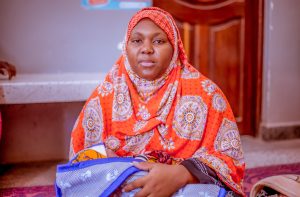
Jamira Mohamed Faraji: beneficiary of the GPC Program
Insights from the Health Center.
Dr. Abdurahman Ramadhan who is a facility in charge at Mtofaani Health Center has said, “We received the group prenatal care service nine months ago, normally here we do a clinic in our center, but after finding our friends Milele Zanzibar Foundation, they brought us this service where we take pregnant women instead of the services we usually give them, we include them together, we provide services to groups where they become the main participants in knowing their health and the development of their children, in that group participation they get the chance to ask questions directly, they ask each other and ask us more closely, it has led to big changes, different from what we were doing in the beginning”.
Aisha Hamza Khamis a Nurse Midwife also added, “My advice to the Government as well as to the stakeholders to support this program to be progressed, it will help in the community to reduce maternal and child deaths because a large percentage of maternal and child deaths occur due to not understanding the signs of danger for pregnant women, the existence of this program helps to explain to mothers the signs of danger for pregnant women, preparations for childbirth, also safe childbirth after they have given birth”.
The model of training.
According to a Senior Facilitator of the GPC program, Saada Mohamed “During the training to these pregnant mothers in groups, we were able to provide training using small groups within the group, we were able to do different games within the group to make these mothers able to gain more understanding, we witnessed that these mothers were able to motivate their husbands, and they were able to come with them in training, participate in the prenatal care group program”.
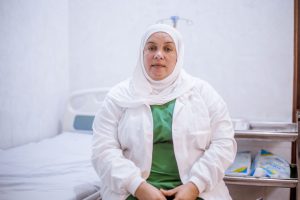
Saada Mohamed Said: A Senior Facilitator of the GPC program
Mwanamvua Said Nassor she is also a GPC training facilitator has said, “Through this GPC program we have built the capacity of mothers to raise their pregnancies correctly, as well as after giving birth to raising their children correctly, our program connects three services at the same time, proximity to tests, and exploration, where during the investigation of the pregnant mother, we free her from the baby’s pulse in the womb, we use a special device where the pregnant mother listens to the baby’s heartbeat, something that previously they didn’t do and they don’t even know the baby’s heartbeat”.
“My opinion to Milele Zanzibar Foundation, continue to progress this program, here we have started with only two centers, Bumbwisudi and Mtofaani, and I request this education to be delivered to all their centers in Unguja and Pemba because it is an excellent education that has given us light, we have found that we were able to reduce, child deaths because among our 42 pregnant women, none of them experienced a pregnancy complication”, added Mwanamvua.
The beneficiaries’ women from Bumbwisudi Shehia.
“We used to study well in groups, we were rested, we were just having fun as children, so we liked their services, they told us there are many things, it is not recommended for pregnant women to stay for a long time without eating, they told us because we were not aware, they said that a pregnant should have five meals a day, we should be eating different types of food, such as fruits and fatty foods, vegetables, and cassava as part of carbohydrate foods”. Expressed Asma Idi Ali a benefit of the GPC program from Bumbwisudi Shehia.
Also, Ilham Ramadhan Nassor added, “In this program, I have benefited in terms of blood, when I came here I was three months pregnant and I just started the Clinic I was anemic, but every time we came here to be taught in groups I benefited from the foods, my blood started to increase every time I went until I reached the time of delivery my blood was high, so in this program I have benefited a lot in terms of blood, and in terms of foods I have benefited a lot because there are other foods I did not know if they add blood for example, if you boil vegetables without straining water, so for me I was cooking vegetables and straining the water, by the way, that water was the blood itself”.
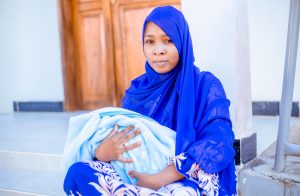
Asma Idi Ali from Bumbwisudi Shehia.
Insights from the Health Center.
“There is a big difference between the provision of services to individual mothers and the provision of services to pregnant mothers in groups, first when we provide services to pregnant mothers individually, you can spend half an hour on one mother and then half an hour on another mother, you find yourself spending a big time, First of all, mothers they wait for a long time outside, after coming to the GPC program, you find yourself in a short time serving many people”. Said Amina Mzee Khatib Assistant In charge of Bumbwisudi Health Center.
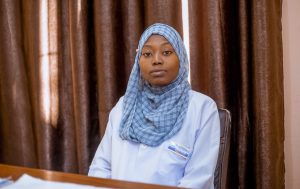
Amina Mzee Khatib Assistant In charge of Bumbwisudi Health Center
About Data, a Nurse Midwife Asma Khadija Gharib stated, “Our group prenatal care, we are thankful that it has been successful, and we have reached the goals, in this Shehia we had 22 mothers, among them 21 mothers gave birth in this center, most of them being in their first pregnancy”.
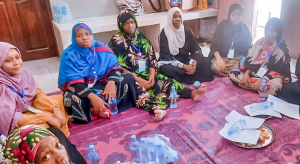
Pregnant women are being provided clinical services in groups, during the GPC Program.

